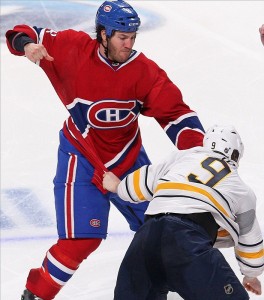Montreal Canadiens general manager Marc Bergevin didn’t have to make a big splash in the free-agency pool to make an impact, trading Brandon Prust to the Vancouver Canucks for Zack Kassian and a 2016 fifth-round pick.
In more minor moves, the Canadiens extended Greg Pateryn to a cost-effective, two-year, $1.6 million contract and signed Montreal native and fellow defenseman, Mark Barberio to a two-way deal. Bergevin also inked minor-league blue-liner Joel Hanley and forward George Holloway. However, the most significant move of Bergevin’s day was no doubt the Kassian acquisition.

A Potential Power Forward
Out goes Prust, a 31-year-old forward who carved a niche as a versatile player who can play anywhere in the lineup (but less and less in the top six). In comes a 24-year-old, 6’3”, 214-pound former first-round pick and potential power forward who just happens to play right wing, Montreal’s weakest position. Kassian’s defense might be lacking, but his offense is the key to this trade.
That isn’t to say that Kassian will necessarily become that top-six forward Montreal needs or even the one the Habs just got rid of in P.A. Parenteau. But the door shouldn’t be shut on that possibility. In 2013-14 he scored 14 goals and 15 assists in 73 games. In 2014-15, admittedly playing just 42 games due to various ailments including a bad back, he was on pace for a similar point total, but more goals (10, on pace for 20 in 82 games).
Taking into account his absurdly high 18.2% shooting percentage last season, it’s almost as if Montreal landed their own Matt Beleskey, but at the right position and at a fraction of Beleskey’s eventual cost with a $1.75 million cap hit (RFA next season). The Canadiens even save $750K against the cap with this deal to maybe go out and improve their offense even more.
Seeing as Kassian’s shooting percentage has been above 14% the past three seasons (14.1% in his career), they might have actually landed a more valuable piece than the arguably top-ranked free agent himself (Beleskey’s is 9.9% in his career). That is, if Kassian can stay healthy.
Zack Kassian vs. Brandon Prust

Prust is almost Kassian’s polar opposite, starting with his durability, having played all 82 games this past season, and ending with his contract that paid him an average of $2.5 million per year since being signed for the start of the lockout-shortened 2012-13 season.
Prust was always overpaid. That much isn’t in doubt. His four goals (14 assists) this past season reaffirm that fact. He was still valuable, though, especially on defense, as indicated by his 1:45 min. per game on the penalty kill to place immediately behind Tomas Plekanec.
In that sense, and from a heart-and-soul perspective, Montreal loses a great deal. But, considering his age, the beating he takes on a regular basis, this is almost a repeat of the Josh Gorges deal from a year ago, when Bergevin arguably decided to trade a guy before his performance inevitably dropped.
Whether Gorges’ plus/minus -28 rating this past year is more the result of his Buffalo Sabres surroundings than his 31 years is irrelevant. The move today was more about Bergevin’s pro-activeness than Prust, his ill-advised run at referee Brad Watson in the media these past playoffs and all.
That, no doubt, still factored in but arguably not as much as the need to cost-effectively add offense to a goal-deprived lineup. They weren’t going to get that from Prust. They may yet get that from Kassian.
It remains to be seen how well this deal works out for Montreal in the long run, but the fact that there is a long run at all is an undeniable positive. In addition to the draft pick, Kassian will only become a RFA next season. Prust will be a UFA who was never going to be worth his current cap hit and would have been a longshot to be re-signed by the Habs anyway.
Even if the Canadiens don’t know what they’re going to get with Kassian, they come out ahead.
https://www.youtube.com/watch?v=L0-fVLlXosI
.